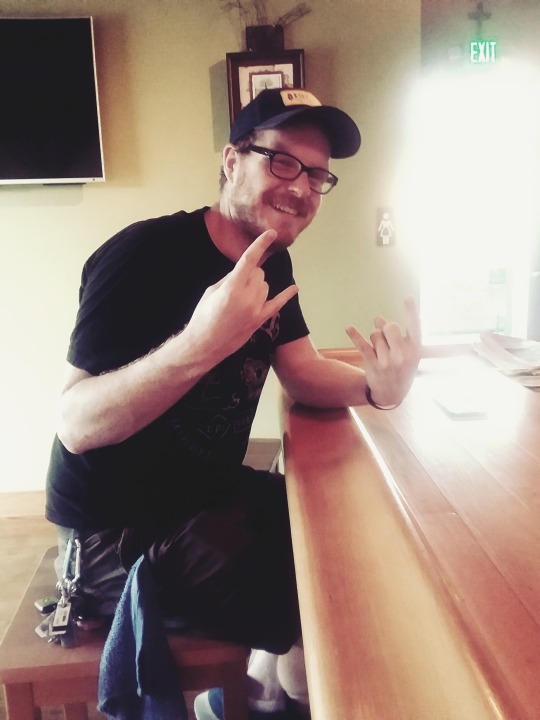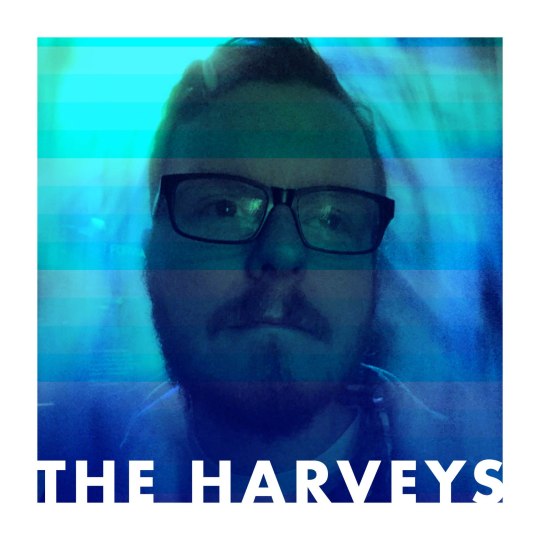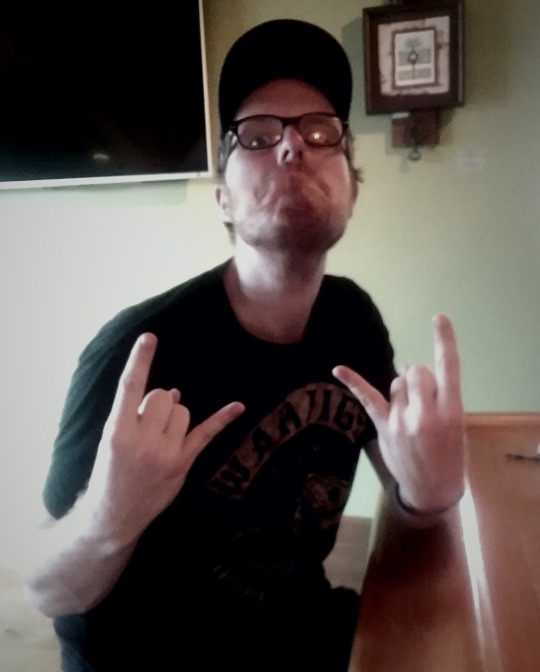Text
Meet The Harveys

NWI native and Chicago resident Charlie Evans wants to introduce you to his one man band The Harveys, whose debut album, after over a year in the making, is nearing the completion stage. As Evans labors through the finishing touches of the LP and prepares it for public release, he sits down with me to talk about the project and tells us what we can expect from his esoteric alter-ego.

HW: You're getting ready to release your first LP; a collection of songs you're putting out under the name The Harveys. But essentially The Harveys is just you. What made you decide to release music as a fictional collective rather than under your own name?
CE: The Harveys isn't a real band right now, so the idea that it can be locked into only one thing doesn't appeal to me since I don't have to fight other people to have it be whatever it needs to be. I’ve never been comfortable with the idea of existing as a solo act. I feel like the idea of the Harveys started as a crutch of being afraid to do this on my own. For whatever reason, the idea of having a fictional band made it seem like a more viable project in my head, and more approachable as something to present out to the world.
HW: But you're not literally the only player on the record. Who else appears on the album, and in what capacity?
CE: One song is an old one that was written as a group by Patrick Biancardi, Sam Evans, and myself....
HW: Right...that's Werewolf Teacher, isn't it? That's a great song and I remember you telling me that it has its origins in your time as a member of (now defunct Region band) Greenstone.
CE: Greenstone was a great time as a band, and helped form a lot of the stuff that I wrote and created on this album. When I began working on recording I wanted to get an old song down that we had never had the chance to properly record. It was a great point to learn how to use recording software and to test the viability of the fictional band project. A lot of the music I wrote afterwards feels similar in some ways to what we were working on with that project, but definitely is a different animal. Not writing in collaboration with other people or having to compromise things is both a blessing and a curse.
HW: Who are some of the other people who pitched in to help make this LP?
CE: Alex Akers contributed trumpet to I Sit Differently at the Piano. I met Alex while I was working for New Oberpfalz brewery, and we struck up conversation pretty naturally. I had completed about half of the the track, adding in the vocal snippet and guitar, but I felt that guitar all the way through would be frankly boring. I basically asked Alex if he wanted to add trumpet to a weird track that I had made and sent it over. About a week later he sent me his layered tracks and it was amazing! My primary instrument is the electric guitar, so it's always really awesome to work with other instrumentalists that can bring a completely different feel to a track. That song wouldn't work without Alex's contribution. Jake Egli plays the keyboards on The Somnambulist and helped me mix and master the record along with production work.
I'm definitely open to the idea of adding a more collaborative element to The Harveys. I would love to be able to flesh it out into a full band setting. I think a lot of these songs would translate pretty well to a live setting, and there's lots of song ideas in reserve. There's always ego involved in adding other people to a band, but I enjoy the collaborative aspect of writing music a lot. Sometimes it's okay to come in with an idea and see how it gets morphed into something completely new, original, and different that way.
HW: Having grown up as an aspiring musician in NWI and now living in Chicago, can you compare the two locales where musical heritage is concerned?
CE: I would say that both have a lot in common with each other, with Chicago getting the edge of diversity simply through pure numbers. Not unlike most other suburbs of Chicago, NWI filters a lot of its musical identity from Chicago, which I think is great. The Chicagoland area has an abundance of amazing music that doesn't always get the attention it deserves on the national stage.
HW: You recorded this LP at home on your computer. Were there any technical limitations that you encountered while making the record that, had you been in a studio, you might not have had to deal with?
CE: I think the biggest hurdle for doing all recording on my own is that my ear wasn't as trained, especially in the beginning, at what was good and what was bad. I improved rapidly, but especially early on I think that having a 2nd set of ears to hear everything is very helpful.
HW: Why did you decide to release a physical LP and how do you plan to market it? What streaming formats will you be utilizing?
CE: I love the idea and the ritual of vinyl...placing the vinyl on the turntable, setting it to the right speed, and letting the needle hit the record. There’s an art to creating a track list and an album that flows correctly from side to side. I think the best records still work with that duality; breaking it down into two shorter playlists and making sure those statements stand on their own and complement each other. That being said, I think the songs stand on their own, so I don’t mind pushing it to streaming as well where the majority of people (myself included) discover their music. I’m planning on releasing The Harveys on all major streaming services. The LP version of the album will be funded through a Kickstarter.
What I like about the idea of a vinyl release and giving yourself those limitations is that it really forces you to look at how songs flow as a cohesive unit. Balancing the amount of time you can put on a side along with making sure that each track is keeping the listener along for the ride is so important. Additionally, the 2 side nature of vinyl makes you look at it as a mini suite for each side. My process was mostly trying to balance all of these things to make the strongest single unit of an album. Sifting through all the songs I had written to put together what I feel is a cohesive album was a bit difficult at first, there’s definitely enough material left off to have an extra EP in the future or work towards another album. For me, I think the unifying threads that make this album stand as a whole are some of the themes touched on like growing up and the somewhat lonely existence that adulthood can be. There’s plenty of humor on the record, though, as well, which I feel is always needed. I don’t trust people who are too serious about everything. There's a lot of genre exploration that I wasn't able to make work cohesively on this record that could definitely fit in better on a slightly different project. I would love to create a great medley style suite, ala Abbey Road. I'd love to do something soaring, epic, and heartfelt like that.
HW: There are very few recording artists who so confidently pull off such a varied palette as what you've proven capable of on this LP; some that come to mind as exceptions are Ween and Captain Beefheart and Zappa and Guided By Voices. Were any of those artists a lighthouse for you while you were crafting these songs?
CE: All those bands and artists are huge influences, Ween in particular. Reading and getting into Ween was a huge part of what made me finally get off my butt and start making music again. The independent spirit that drove each of these artists to create despite not necessarily having the big push of a label was a huge inspiration. Learning about Ween using a drum machine and writing silly songs and just generally not caring what other people thought of them was a liberating idea, and also made my excuses for why I wasn’t doing anything seem like just that: excuses.
HW: Speaking of tracks that DIDN'T make the record, Feed Me, Human is one of your standout songs and I feel like it exists in a world of its own stylistically; some kind of avant garde heavy metal oddity...definitely something I haven't heard before. Is metal a big part of your musical tastes, and if so what can you tell me about this track? It sort of skirts a strange territory that's both playful and sinister.
CE: I love metal! Metal as a genre is so tongue in cheek, and I love that about it. I never trust any metal band that takes themselves 100% seriously. I remember reading a story that Adam Jones from Tool told about how when he met Buzz Osbourne from the Melvins he told him that Boris was his favorite song and was a foundation for a lot of how he built his songwriting and sound, and Buzz responded something along the lines of, "Thanks, it's about my cat." Metal is so great because it can occupy both territories of sinister and silly.
HW: Let's focus on what did make the album. Metropolitan Malaise is unabashed power pop exuberance; Hydration is Key is a blissed out, psychedelic signal from another galaxy. You cover Big Star's 1972 acoustic masterpiece 13, and then there's the aforementioned I Sit Differently at the Piano; four minutes of Badalementi-esque guitar and trumpet noodling atop which sits a bizarre sampling of an interview with a mental patient from the early 60s. The Funkalator struts and swaggers with ballsy, bell bottomed moxie, and Werewolf Teacher is textbook singer-songwriter gold. And that's just HALF the album. But maybe the standout track here is The Somnambulist, a disarming number that begins with a tribal, measured acoustic bounce before exploding into a veritable roman candle of life-affirming guitar-fueled adrenaline.
CE: I'm particularly proud of The Somnambulist. It has the most overdubs of any track, and took me the longest to assemble out of any of them. I'm particularly proud of my vocal performance, which incubated in my head for a pretty long time, and took even longer to build up the ability to properly sing. It's the classic rock track I always wanted to write.
HW: What's your writing process like? What do you find is the most challenging part of the formula?
CE: Wake up, make some coffee pick up my guitar and start playing something...pulling up Garageband and a virtual drummer and see if I can get anything useful out of it. Record it, and see if there’s enough there to develop. Sometimes there's something good there for a full song, sometimes there isn't. I built a lot of songs on the fly, and would do multiple takes of things to see what worked or didn’t work. Having a good feedback network of people to send songs to certainly helped as well to guide the directions that were working and not working in the music. I think the most challenging thing for me with this project was not really working with other musicians to create. If I wanted to finish the song, it was on me!
HW: I really appreciate you taking the time to offer a little insight into what we can expect from The Harveys. I really think you've assembled a great collection of songs and I'm really looking forward to the vinyl.
CE: I think the biggest thing I’m hoping to offer is a bit of a blast of nostalgia that isn’t hopefully too derivative. Power pop and dad rock have reached the level of being uncool, but I still love making it. I’m hoping that I can bring some uncool music to people and hopefully get them to dig into the same things I love too. I was talking with Jake while we were mixing and mastering and we both said waiting for lightning to strike will involve you mostly waiting. It’ll happen, and does happen, but you have to work at it no matter what.
-End-
The debut LP from The Harveys will be available soon pending a Kickstarter. Please stay tuned to Charlie's Facebook page for more info and show your support for this gifted musician. You can stream the unmixed demo of Metropolitan Malaise on Bandcamp here:
https://theharveysarentreal.bandcamp.com/track/metropolitan-malaise

Album art by Grace Calderone, 2019. Bar photos by Harvey Woodlawn, 2018.
7 notes
·
View notes